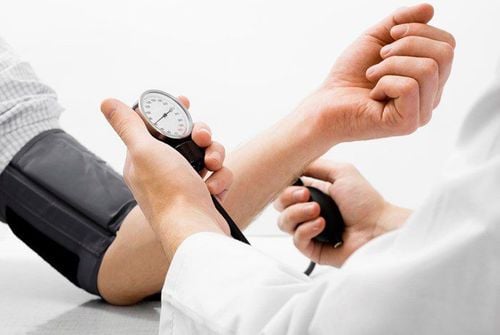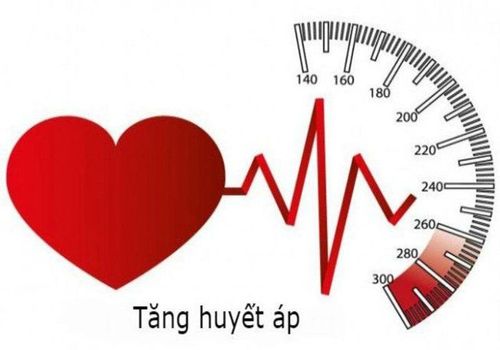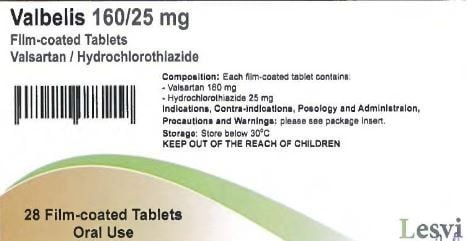This is an automatically translated article.
The article was professionally consulted by Doctor Hoang Thi Anh Tuyet - Department of Obstetrics and Gynecology - Vinmec Central Park International General Hospital.High blood pressure during pregnancy is common, occurring in 10% of first-time pregnancies and 8% of all pregnancies. Using drugs to treat high blood pressure for pregnant women is an effective measure to help treat the disease. However, when using drugs, pregnant women need to strictly follow the doctor's instructions because some drugs can cause unpredictable side effects for both mother and baby.
1. Overview of gestational hypertension
Hypertension occurs in 10% of first pregnancies and 8% of overall pregnancies. In pregnant women with high blood pressure, the fetus often has growth retardation, low birth weight, malnutrition, and even premature birth due to poor blood supply to the fetus.During regular prenatal check-ups, the doctor will check the pregnant woman's blood pressure. If blood pressure exceeds 140/90 mmHg (systolic/diastolic pressure) it is called high blood pressure.
Types of gestational hypertension include:
Chronic high blood pressure: High blood pressure that occurs before pregnancy but is detected only during routine antenatal care; Preeclampsia: High blood pressure was first detected after the 20th week of pregnancy with manifestations of edema, proteinuria. This condition can be life-threatening for both mother and baby if not treated promptly as preeclampsia turns to eclampsia: the pregnant woman turns into a coma due to progressive blood poisoning, causing brain complications (headache, convulsions), in the eyes (blurred vision), in the liver (abdominal pain), ... and easily lead to death;

Tiền sản giật do cao huyết áp
2. Which drug is used to treat high blood pressure for pregnant women?
Here are the drugs that are preferred in the treatment of high blood pressure for pregnant women because their ingredients are safe and do not cause side effects for the mother and the fetus:Methyldopa (aldomet): As a central nervous system antihypertensive drug, indicated for the treatment of high blood pressure in pregnant women because it does not have a negative effect on the vascular distribution of the uterus - placenta and embryo. Methyldopa is usually made in tablet form with a strength of 250mg or 500mg. However, drug users should also be aware of some side effects of the drug such as drowsiness, dizziness and liver dysfunction; Hydralazine (Apresoline): A vasodilator and peripheral resistance reducer, has antihypertensive effect, especially in pregnant women with severe hypertension and preeclampsia. In pregnant women, Hydralazine should be used to treat high blood pressure in the form of intravenous injection; Labetalol (trandate): An antihypertensive drug that blocks and inhibits receptors in peripheral vessels, helping to reduce peripheral resistance, lowering blood pressure. This drug is safe for pregnant women. Labetalol is usually made in the form of tablets with strengths of 100mg, 200mg or can also be in the form of injections.
3. Pregnant women should not use any medicine to treat high blood pressure?
High blood pressure drugs of the following groups are not recommended for use in the treatment of high blood pressure in pregnant women. The reason is that these drugs, when entering the body, will cross the placenta and cause harm to the fetus such as causing hypotension, kidney failure, anuria,... even birth defects or fetal death,...Groups of drugs that should be avoided include:
ACE inhibitors (captopril, lisinopril, enalapril) If using this group of drugs for pregnant women in the last 6 months of pregnancy, they will experience side effects such as hypotension, Hyperkalemia and renal failure in the fetus, leading to limb atrophy, facial deformity, pulmonary hypoplasia, malformation, neonatal skull hypoplasia, intrauterine growth retardation and stillbirth,... Therefore, doctors recommend not to use ACE inhibitors during the last 6 months of pregnancy.
If for some reason it is necessary to use this group of drugs, it is necessary to periodically ultrasound to evaluate the vaginal environment, if detecting a decrease in amniotic fluid (representing a decline in fetal kidney function), then The drug should be stopped immediately, except in an emergency that needs to save the mother's life.
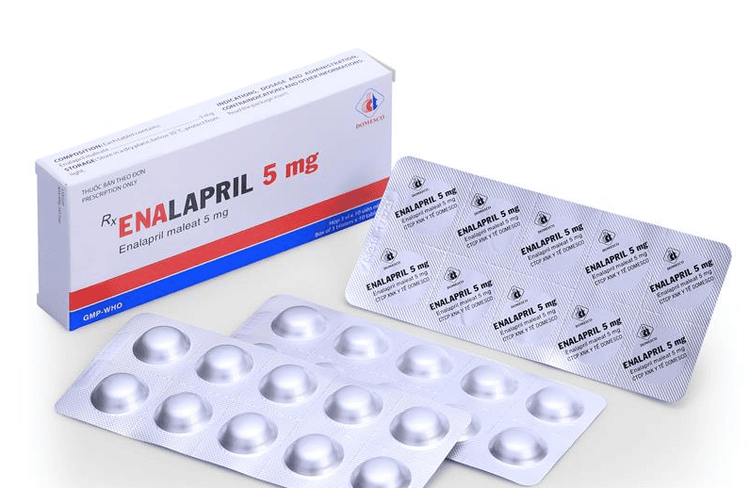
Mẹ bầu không nên sử dụng thuốc enalapril
Group of calcium blockers (nifedipine, amlodipine) This group of drugs can strongly reduce blood pressure, leading to decreased uterine perfusion, causing hypoxia to the fetus. In humans, the use of calcium channel blockers for adverse effects has not been adequately studied. In special cases, because nifedipine has antispasmodic properties, it is necessary to treat the threat of abortion as prescribed by the doctor, and the use of the drug must be carefully monitored.
Angiotensin II receptor antagonists (telmisartan, losartan, irbesartan) This group of drugs causes fetal side effects similar to ACE inhibitors but to a greater extent. Therefore, doctors do not recommend taking angiotensin II antagonists during the last 6 months of pregnancy. If for some reason it is necessary to use the drug in the first 3 months of pregnancy, it is necessary to check, explore and adjust the appropriate drug dose.
Beta-blockers (atenolol) The use of this class of antihypertensive drugs in pregnant women can cause embryo and fetus destruction, slow heart rate in the fetus and neonate. The doctor's recommendation is not to take beta-blockers (atenolol) during the first 3 months of pregnancy.
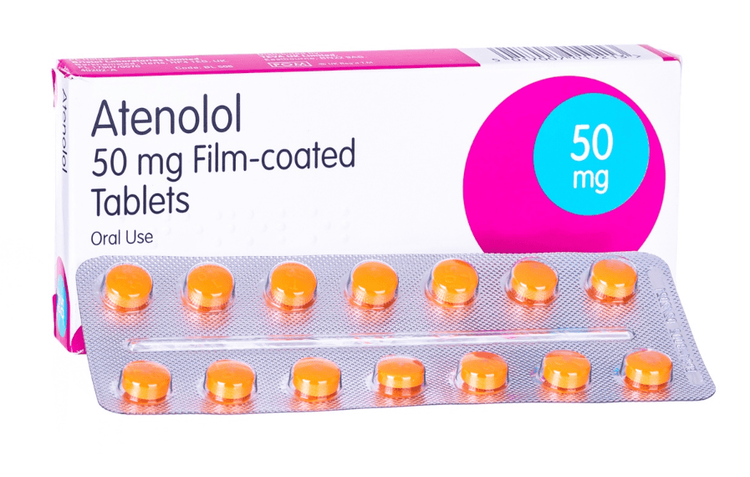
Thuốc atenolol không nên dùng trong 3 tháng đầu thai kỳ
4. Note when using medicine for high blood pressure in pregnant women
Selection of antihypertensive drugs must be safe for pregnant women and pregnant women, the route of drug use depends on the expected time of delivery and does not affect the perfusion of the uterus - placenta; Disease prevention by avoiding teenage pregnancy, controlling weight, proper nutrition, avoiding multiple pregnancies, avoiding smoking, using alcohol,...; Recognizing high blood pressure as soon as possible to give appropriate prevention and treatment measures at an early stage, the disease is still mild; Young people with early hypertension should take advantage of pregnancy when the disease is not serious to take measures to bring blood pressure to an acceptable level without using drugs such as: Improve diet, exercise, avoid stress nerve,...; Pregnant women with high blood pressure should have regular check-ups, especially when transitioning to another stage of pregnancy so that the doctor can adjust the appropriate medication if necessary; In the unlikely event of having to take an unsuitable drug, the doctor will weigh the benefits and risks to make the right choice. At this time, it is necessary to carefully monitor and inform the patient to coordinate in the best way
Mẹ bầu nên đến gặp bác sĩ khi phát hiện tăng huyết áp
At the existing Vinmec International General Hospital package maternity services as a solution to help pregnant mothers feel secure because of the companionship of the medical team throughout the pregnancy. When choosing Maternity Package, pregnant women can:
The pregnancy process is monitored by a team of qualified doctors Regular check-up, early detection of abnormalities Maternity package helps to facilitate the process. birthing process Newborns get comprehensive care
Please dial HOTLINE for more information or register for an appointment HERE. Download MyVinmec app to make appointments faster and to manage your bookings easily.






